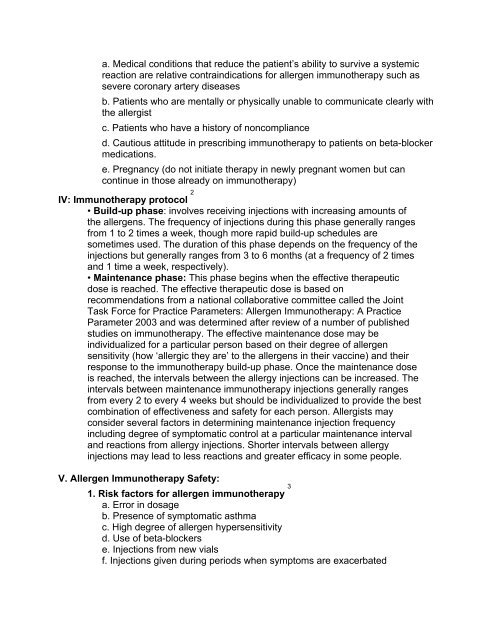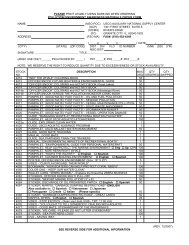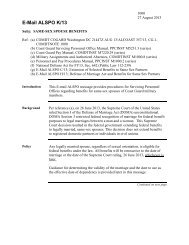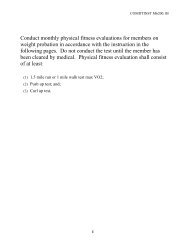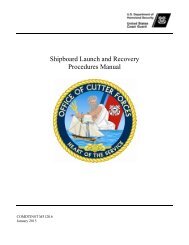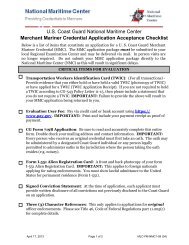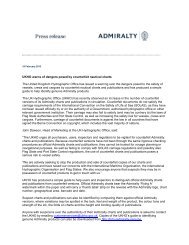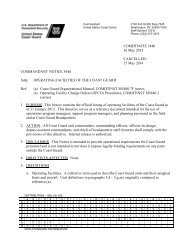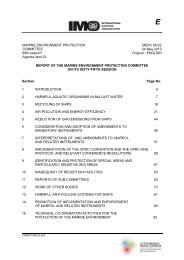Immunotherapy Safety for the Primary Care ... - U.S. Coast Guard
Immunotherapy Safety for the Primary Care ... - U.S. Coast Guard
Immunotherapy Safety for the Primary Care ... - U.S. Coast Guard
You also want an ePaper? Increase the reach of your titles
YUMPU automatically turns print PDFs into web optimized ePapers that Google loves.
a. Medical conditions that reduce <strong>the</strong> patient’s ability to survive a systemic<br />
reaction are relative contraindications <strong>for</strong> allergen immuno<strong>the</strong>rapy such as<br />
severe coronary artery diseases<br />
b. Patients who are mentally or physically unable to communicate clearly with<br />
<strong>the</strong> allergist<br />
c. Patients who have a history of noncompliance<br />
d. Cautious attitude in prescribing immuno<strong>the</strong>rapy to patients on beta-blocker<br />
medications.<br />
e. Pregnancy (do not initiate <strong>the</strong>rapy in newly pregnant women but can<br />
continue in those already on immuno<strong>the</strong>rapy)<br />
IV: <strong>Immuno<strong>the</strong>rapy</strong> protocol 2<br />
• Build-up phase: involves receiving injections with increasing amounts of<br />
<strong>the</strong> allergens. The frequency of injections during this phase generally ranges<br />
from 1 to 2 times a week, though more rapid build-up schedules are<br />
sometimes used. The duration of this phase depends on <strong>the</strong> frequency of <strong>the</strong><br />
injections but generally ranges from 3 to 6 months (at a frequency of 2 times<br />
and 1 time a week, respectively).<br />
• Maintenance phase: This phase begins when <strong>the</strong> effective <strong>the</strong>rapeutic<br />
dose is reached. The effective <strong>the</strong>rapeutic dose is based on<br />
recommendations from a national collaborative committee called <strong>the</strong> Joint<br />
Task Force <strong>for</strong> Practice Parameters: Allergen <strong>Immuno<strong>the</strong>rapy</strong>: A Practice<br />
Parameter 2003 and was determined after review of a number of published<br />
studies on immuno<strong>the</strong>rapy. The effective maintenance dose may be<br />
individualized <strong>for</strong> a particular person based on <strong>the</strong>ir degree of allergen<br />
sensitivity (how ‘allergic <strong>the</strong>y are’ to <strong>the</strong> allergens in <strong>the</strong>ir vaccine) and <strong>the</strong>ir<br />
response to <strong>the</strong> immuno<strong>the</strong>rapy build-up phase. Once <strong>the</strong> maintenance dose<br />
is reached, <strong>the</strong> intervals between <strong>the</strong> allergy injections can be increased. The<br />
intervals between maintenance immuno<strong>the</strong>rapy injections generally ranges<br />
from every 2 to every 4 weeks but should be individualized to provide <strong>the</strong> best<br />
combination of effectiveness and safety <strong>for</strong> each person. Allergists may<br />
consider several factors in determining maintenance injection frequency<br />
including degree of symptomatic control at a particular maintenance interval<br />
and reactions from allergy injections. Shorter intervals between allergy<br />
injections may lead to less reactions and greater efficacy in some people.<br />
V. Allergen <strong>Immuno<strong>the</strong>rapy</strong> <strong>Safety</strong>:<br />
1. Risk factors <strong>for</strong> allergen immuno<strong>the</strong>rapy 3<br />
a. Error in dosage<br />
b. Presence of symptomatic asthma<br />
c. High degree of allergen hypersensitivity<br />
d. Use of beta-blockers<br />
e. Injections from new vials<br />
f. Injections given during periods when symptoms are exacerbated


